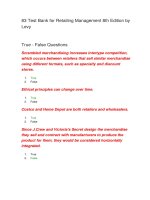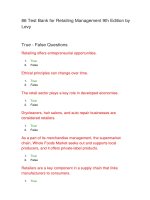Lecture Retailing management (6/e): Chapter 14 - Levy Weitz
Bạn đang xem bản rút gọn của tài liệu. Xem và tải ngay bản đầy đủ của tài liệu tại đây (1.54 MB, 59 trang )
Chapter 14
Buying Merchandise
McGrawHill/Irwin
Retailing Management, 6/e
Copyright © 2007 by The McGrawHill Companies, Inc. All rights reserved.
14-
Merchandise Management
Planning
Merchandise
Assortments
Retail
Communication
Mix
Buying
Merchandise
Buying
Systems
Pricing
2
Merchandise Branding Strategies
– Designed, produced, and
marketed by a vendor
and sold by many
retailers
• Private-Label (Store)
Brands
– Developed by retailer
and only sold in retailer’s
outlets
The McGraw-Hill Companies, Inc./Jill Braaten, photographer
• Manufacturer (National)
Brands
143
Spectrum of
National vs. Private Label
144
National
Brands
% Store
Brands
The Gap
Macy’s
WalMart
Limited
Target
Home Depot
Marks &
Spencer
IKEA
14-
Value of Retail Brands
5
Relative Advantages of
Manufacturer versus Private Brands
Impact on Store
Type of Vendor
Manufacturer
Brands
Private-Label
Brands
Store loyalty
?
+
Store image
+
+
Traffic flow
+
+
Selling and promotional
expenses
+
-
Restrictions
-
+
Differential advantages
-
+
Margins
?
?
146
Private Labels
Advantages
• Unique merchandise
not available at
competitive outlets
• Difficult for customers
to compare price with
competitors
• Higher margins
147
Disadvantages
• Need to develop
expertise in developing
and promoting brand
• Unable to sell excess
merchandise
• Typically less desirable
for customers
Manufacturer (National) Labels
• Advantages
• More desired by
customers
• Resell excessive
merchandise
• Don’t need skills and
people to develop and
promote merchandise
Disadvantages
• Lower margins
• Vulnerable to
competitive
pressures
• Limit retailer’s
flexibility
148
149
Buying from Vendors of National Brands
• Helps retailers build their image
• Helps build traffic flow
• Reduces selling and promotional expenses
The McGraw-Hill Companies, Inc./Lars Niki, photographer
Most Recognized Apparel
10
and Accessory Manufacturer Brands
14-
Most Recognized Apparel
and Accessory Private Label Brands
1411
Examples of
Private-Label Brands
1412
Examples of
Private-Label Brands
1413
Examples of
Private-Label Brands
1414
Examples of
Private-Label Brands
1415
Going to Market for National Brands
16
• Wholesale Market Centers
– National Markets (new York), Regional Markets
(Atlanta, Miami)
• Trade Shows
– Frankfurt Book Fair, Las Vegas Consumer
Electronics, Atlanta Sporting Goods
• Internet Exchanges
– Worldwide Retail Exchange
• Meeting Vendors at Your Company
• Diverters, Closeout Specialists, Liquidators, Other
Retailers (Gray Markets, Diversion)
14-
14-
What do Buyers do at Market?
17
• Meet with vendors
• Discuss performance of vendor’s merchandise
during the previous season
• Review the vendor’s offering for the coming
season
• May place orders for the coming season
• Sometimes they do not buy at market, but
review merchandise, return to their offices to
discuss with the buying team before negotiating
with vendors
Negotiating with Vendors
1418
Two-way
communication
designed to reach
an agreement
when two parties
have both shared
and conflicting
interests.
Royalty-Free/CORBIS
14-
Planning Negotiations
• Consider prior history
• Assess current situation
– General market conditions
– Vendor’s position
– Power of vendor
• Set goals
• Be aware of vendor’s goal’s
• Number of people involved
• Select an advantageous place
• Be aware of deadlines
19
14-
Issues to Negotiation
20
Price and gross margin
Additional markup opportunities
Purchase terms
Delivery times and exclusivity
Advertising allowances
Transportation
Steve Cole/Getty Images
Types of Negotiations
Win
Win
Buyer
Lose
Vendor
Lose
1421
Win - Lose Negotiation
• Can be good in the short run and
bad in the long-run
• Short-term solution-- person you are
negotiating with can’t lose all the
time
• Might degenerate into LOSE LOSE
1422
14-
Lose - Lose Negotiation
• Wastes time and energy
• No relationships established
• Objectives not met
23
1424
Win - Win Negotiation
Collaboration
Cooperation
Long-term relationship
Doesn’t mean “giving-in”
Enhances vendor trust
Royalty-Free/CORBIS
14-
Guidelines for Negotiations
• Separate people from problem
• Insist on objective criteria to evaluate
performance
• Invent options for mutual gain
• Let the other party do the talking
• Know how far to go
25









